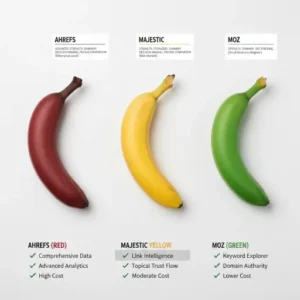Comprehensive Guide to Avoiding Common SEO Mistakes in Digital Content Production
In the ever-evolving world of digital marketing, SEO plays a crucial role in ensuring your content reaches the right audience. However, many content creators and marketers often fall into common SEO pitfalls that can hinder their efforts. This guide aims to educate you on the most frequent SEO mistakes in digital content production and provide actionable advice to avoid them.
Importance of Keyword Research Keyword research is the foundation of any successful SEO strategy. Without proper keyword research, you risk targeting irrelevant or overly competitive keywords, which can negatively impact your rankings.
Tools for Effective Keyword Research Utilize tools like Google Keyword Planner, SEMrush, and Ahrefs to identify relevant keywords. These tools help you understand search volume, competition, and trends, allowing you to make informed decisions.
Identifying Long-Tail Keywords Long-tail keywords are specific phrases that target niche audiences. They often have lower competition and higher conversion rates. For example, “common SEO mistakes in digital content production” is a long-tail keyword that targets a specific audience interested in avoiding SEO errors.
Content Quality
Creating High-Quality Content High-quality content is informative, engaging, and valuable to your audience. Avoid creating duplicate or thin content, as these can harm your SEO efforts. Focus on providing unique insights and actionable advice.
Importance of User Intent Understanding user intent is crucial for creating content that meets your audience’s needs. Ensure your content answers their questions and provides solutions to their problems.
Keyword Usage
Optimal Keyword Density Keyword density refers to the percentage of times a keyword appears in your content. Aim for a keyword density of around 1-2% to avoid keyword stuffing while maintaining relevance.
Avoiding Keyword Stuffing Keyword stuffing is the practice of overusing keywords in your content. This can lead to penalties from search engines and poor user experience. Use keywords naturally within your content.
Natural Integration of Keywords Integrate keywords seamlessly into your content. Use variations and synonyms to maintain a natural flow. For example, instead of repeatedly using “SEO mistakes,” you can use “SEO errors” or “SEO pitfalls.”
Meta Tags and Descriptions
Crafting Effective Meta Titles Meta titles are crucial for SEO as they appear in search engine results. Ensure your meta titles are compelling and include primary keywords. For example, “Avoiding Common SEO Mistakes in Digital Content Production.”

Writing Compelling Meta Descriptions Meta descriptions provide a brief summary of your content and appear in search results. Write engaging meta descriptions that include primary keywords and encourage clicks.
Importance of Unique Meta Tags Each page on your website should have unique meta tags to avoid duplication. This helps search engines understand the content of each page and improves your SEO.
Mobile Optimization
Ensuring Mobile-Friendly Content With the increasing use of mobile devices, it’s essential to ensure your content is mobile-friendly. Use responsive design to adapt your content to different screen sizes.
Improving Page Load Speed Page load speed is a critical factor for both SEO and user experience. Optimize images, use caching, and minimize code to improve load times.
Mobile Usability Best Practices Ensure your content is easy to navigate on mobile devices. Use clear headings, short paragraphs, and clickable buttons to enhance usability.
Technical SEO
Importance of Site Speed Site speed is a ranking factor for search engines. Use tools like Google PageSpeed Insights to identify and fix issues affecting your site’s speed.
Fixing Broken Links Broken links can harm your SEO and user experience. Regularly check for and fix broken links using tools like Screaming Frog.
Ensuring Proper URL Structure A clean and organized URL structure helps search engines understand your site’s hierarchy. Use descriptive URLs that include primary keywords.

Internal and External Linking
Benefits of Internal Linking Internal linking helps search engines crawl your site and improve user navigation. Link to relevant pages within your content to enhance SEO.
Strategies for Effective External Linking External links to authoritative sources build credibility and improve SEO. Ensure your external links are relevant and add value to your content.
Avoiding Irrelevant Backlinks Irrelevant backlinks can harm your SEO. Focus on building high-quality backlinks from reputable sources.
Visual Content Optimization
Importance of Image Alt Text Image alt text helps search engines understand the content of your images. Use descriptive alt text that includes primary keywords.
Optimizing Images for SEO Optimize images by reducing file sizes without compromising quality. Use formats like JPEG and PNG for better performance.
Using Videos and Infographics Videos and Infographics enhance engagement and provide valuable information. Ensure they are optimized for SEO by including relevant keywords in titles and descriptions.
Staying Updated with SEO Trends
The importance of Staying Current SEO is constantly evolving, and staying updated with the latest trends is crucial. Follow industry blogs, attend webinars, and participate in forums to stay informed.
Avoiding Outdated SEO Techniques Outdated SEO techniques, such as keyword stuffing and irrelevant backlinks, can harm your rankings. Stay updated with current best practices to avoid these pitfalls.
Resources for SEO Updates Utilize resources like Moz, Search Engine Journal, and Google’s Webmaster Blog to stay informed about the latest SEO trends and updates.
Conclusion
Recap of Key Points Avoiding common SEO mistakes is essential for improving your search engine rankings and overall online visibility. By focusing on keyword research, content quality, mobile optimization, technical SEO, and staying updated with trends, you can enhance your SEO efforts.
Final Tips for Avoiding SEO Mistakes
- Conduct thorough keyword research.
- Create high-quality, engaging content.
- Optimize meta tags and descriptions.
- Ensure your content is mobile-friendly.
- Regularly check for technical issues.

Call to Action
Ready to boost your online visibility and achieve higher search engine rankings? Contact us today for a free SEO audit and personalized strategy. Visit Azmat Khan SEO, call us at +92-306-6748834, or email us at info@azmatkhanseo.com. Get a demo of our services and sign up for expert SEO assistance !
By following these strategies, you can create a comprehensive and optimized blog post that stands out in the competitive SEO niche. Let me know if you need further assistance with any specific aspect of your blog post!







